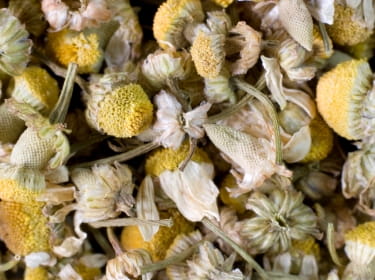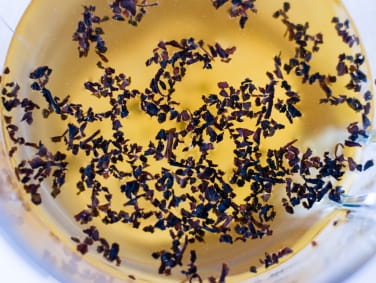Don't Give Herbal Supplements to Infants

The Bottom Line
The American Academy of Pediatrics recommends that children be fed only with breast milk or formula until at least four to six months of age. Children have developed seizures and infections from herbal teas and remedies, lead poisoning and mercury poisoning from traditional remedies, and liver damage from dietary supplements.

The Full Story
Botanical supplements and teas are being given to nine percent of U.S. infants, according to a recent study. The most frequent reasons given by the mothers were to treat fussiness, as an aid to digestion, and to treat colic. The most common supplements and teas were gripe water, chamomile, and teething tablets.
Some of these infants were only one month old, yet the American Academy of Pediatrics recommends that children be fed only with breast milk or formula until at least four to six months of age. Children have developed seizures and infections from herbal teas and remedies, lead poisoning and mercury poisoning from traditional remedies, and liver damage from dietary supplements.
There are many potential problems with giving dietary herbs and teas to infants.
- Infants may respond differently from older children and adults because of their small body weight and immature gastrointestinal, nervous, and immune systems. Even botanical preparations with a long history of traditional use can be contaminated with heavy metals or bacteria. Some traditional preparations, for example some Ayurvedic preparations, contain lead, mercury, and arsenic as intended ingredients.
- Giving botanical preparations to young children may cause allergic reactions. For example, chamomile cross-reacts with other members of the chrysanthemum family.
- There can be interactions with drugs the children are prescribed.
- In the U.S. (unlike in Europe), botanical preparations and dietary supplements are not regulated by the government. There is no assurance that products with the same label actually contain the same ingredients in the same amounts.
- There are few studies of the effectiveness and safety of many of these preparations in infants, including breast-feeding infants whose mothers take them.
Check with your child's health care provider before giving a botanical preparation or tea, or any dietary supplement. Even if the preparation is labeled "for children", there could be reasons an individual child should not receive it. When providing a list of medicines to your health care provider, be sure to list all dietary supplements and teas that you've given the child. If you are breast-feeding, include any dietary supplements and teas that you are taking, also.
Call Poison Control at 1-800-222-1222 if you have a question about particular herbs or supplements. Use the webPOISONCONTROL® online tool for guidance or call 1-800-222-1222 if you think someone has taken too much. webPOISONCONTROL and poison specialists are available to help you 24 hours a day, 7 days a week.
Rose Ann Gould Soloway, RN, BSN, MSEd, DABAT emerita
Clinical Toxicologist
Poisoned?
Call 1-800-222-1222 or
Prevention Tips
- Check with your child’s health care provider before giving a botanical preparation or tea, or any dietary supplement.
- When providing a list of medicines to your health care provider, be sure to list all dietary supplements and teas that you’ve given the child.
- If you are breast-feeding, include any dietary supplements and teas that you are taking, also.
This Really Happened
One evening, an 8-week-old boy had some respiratory symptoms; his skin felt warm to the touch. The next morning he was found with his eyes rolled back, very lethargic with weak muscle tone. In the emergency room, he had very low blood sugar and a very high heart rate. He was bleeding from his stomach and rectum. Many lab values were abnormal and his liver felt large.The child was admitted to the hospital. His liver and kidney function deteriorated. He developed an infection in his urine and blood. He also developed seizures and swelling in his brain. He was treated aggressively and referred for a liver transplant, but the child lived only four days after coming to the hospital.
When the child had been in the hospital for two days, the mother said that she had given her child herbal tea. About 14 hours before he was admitted to the hospital, the child drank about 4 ounces of tea made from mint leaves grown at home. The mint plant was identified by botanists as containing pennyroyal oil. Serum samples from the child contained toxic metabolites of pennyroyal. The child died of the effects of the home-made tea.
Reference: Bakerink JA, Gospe SM, Dimand RJ, Eldridge MW. Multiple organ failure after ingestion of pennyroyal oil from herbal tea in two infants. Pediatrics. 1996;98-944-947.
For More Information
Children and Complementary Health Approaches (NIH)References
Ernst E. Serious adverse effects of unconventional therapies for children and adolescents: a systematic review of recent evidence. Eur J Pediatr. 2003;162:72-80.
FDA warns consumers about the risk of cryptosporidium illness from Baby’s Bliss Gripe Water. FDA News Release September 20, 2007. Accessed May 24, 2011.
Gartner LM, Morton J, Lawrence RA, Naylor AJ, O’Hare D, Schanler RJ. Breastfeeding and the use of human milk. Pediatrics. 2005;115:496-506.
Ize-Ludlo D, Ragone S, Bernstein JN, Bruck IS, Duchowny M, Peňa BMG. Chemical composition of Chinese star anise (Illicium verum) and neurotoxicity in infants. JAMA. 2004;291:562-563.
Saper RB, Kales SN, Paquin J, Burns MJ, Eisenbert DM, Davis RB, Phillips RS. Heavy metal content of Ayurvedic herbal medicine products. JAMA. 2004;292:2868-2873.
Tomassoni AJ, Simone K. Herbal medicines for children: an illusion of safety? Curr Opin Pediatr 2001; 13:162-169.
Woolf AD. Herbal remedies and children: do they work? Are they harmful? Pediatrics. 2003;12:240-246.
Zhang Y, Fein EB, Fein SB. Feeding of dietary botanical supplements and teas to infants in the United States. Pediatrics. 2011;127: 1060-1066.
Poisoned?
Call 1-800-222-1222 or
Prevention Tips
- Check with your child’s health care provider before giving a botanical preparation or tea, or any dietary supplement.
- When providing a list of medicines to your health care provider, be sure to list all dietary supplements and teas that you’ve given the child.
- If you are breast-feeding, include any dietary supplements and teas that you are taking, also.
This Really Happened
One evening, an 8-week-old boy had some respiratory symptoms; his skin felt warm to the touch. The next morning he was found with his eyes rolled back, very lethargic with weak muscle tone. In the emergency room, he had very low blood sugar and a very high heart rate. He was bleeding from his stomach and rectum. Many lab values were abnormal and his liver felt large.The child was admitted to the hospital. His liver and kidney function deteriorated. He developed an infection in his urine and blood. He also developed seizures and swelling in his brain. He was treated aggressively and referred for a liver transplant, but the child lived only four days after coming to the hospital.
When the child had been in the hospital for two days, the mother said that she had given her child herbal tea. About 14 hours before he was admitted to the hospital, the child drank about 4 ounces of tea made from mint leaves grown at home. The mint plant was identified by botanists as containing pennyroyal oil. Serum samples from the child contained toxic metabolites of pennyroyal. The child died of the effects of the home-made tea.
Reference: Bakerink JA, Gospe SM, Dimand RJ, Eldridge MW. Multiple organ failure after ingestion of pennyroyal oil from herbal tea in two infants. Pediatrics. 1996;98-944-947.
